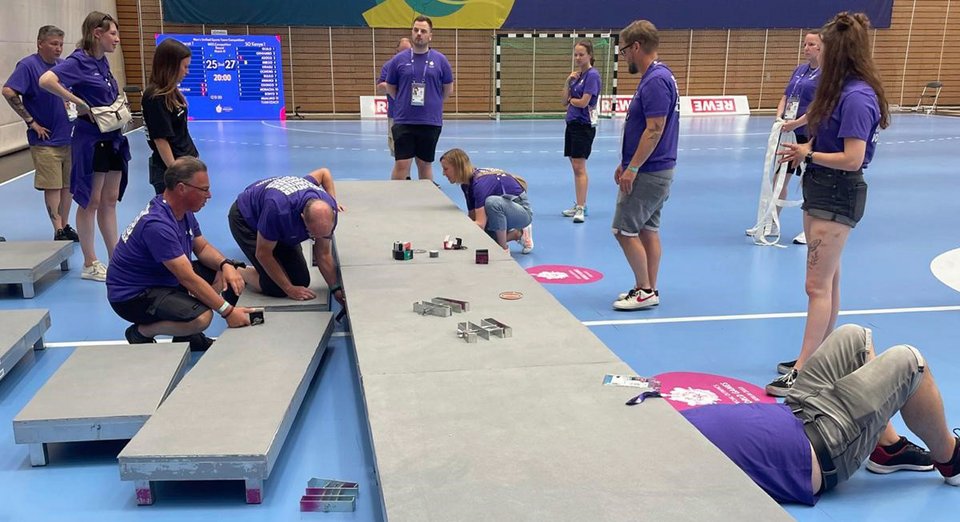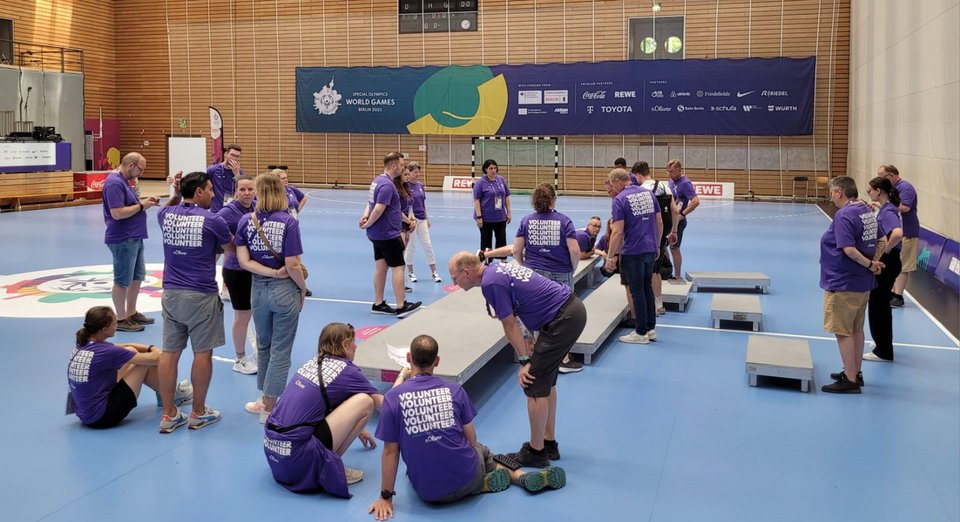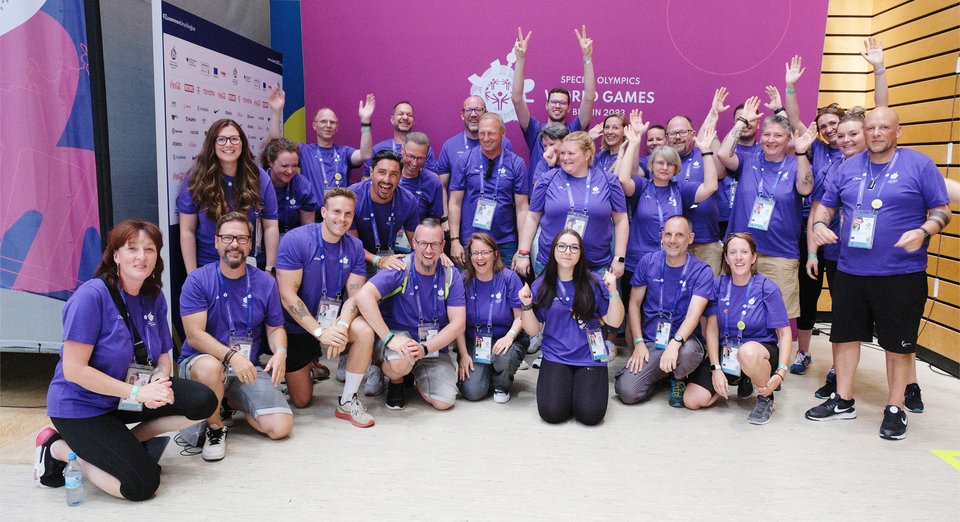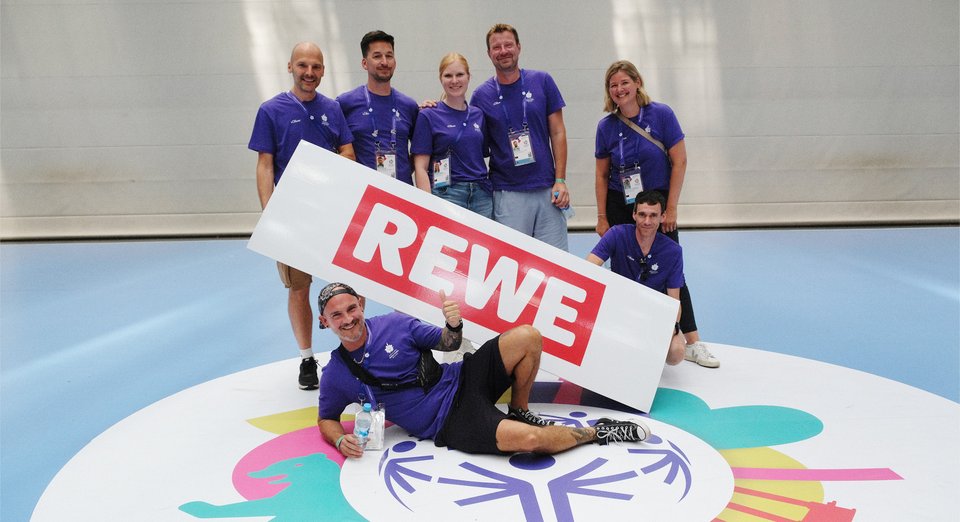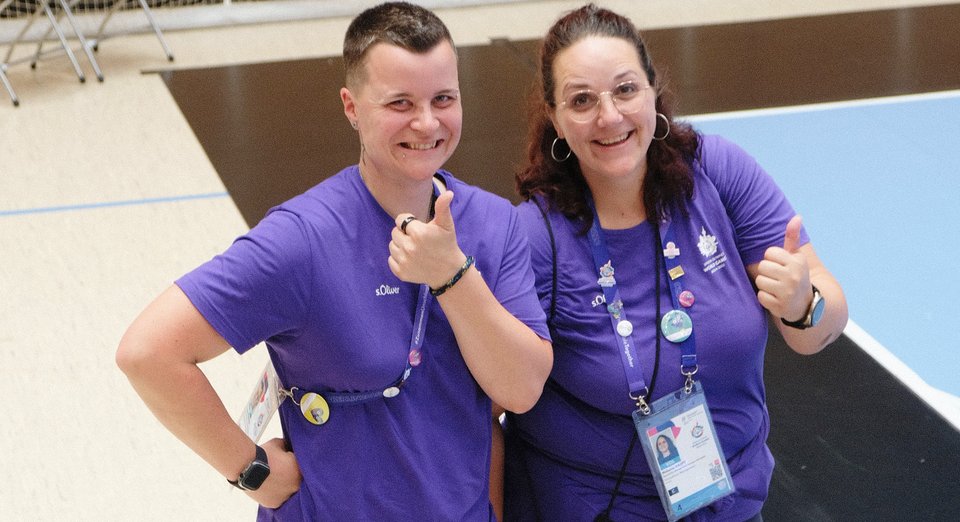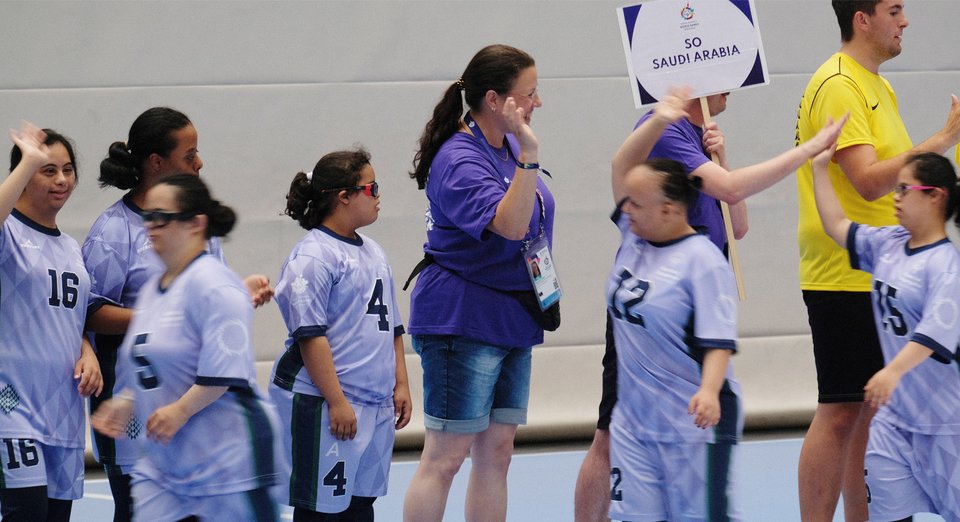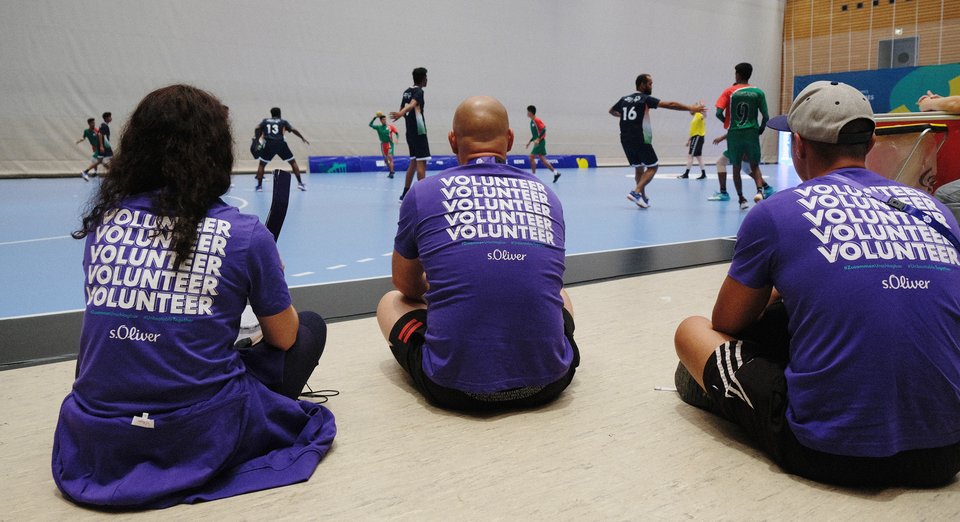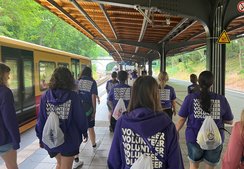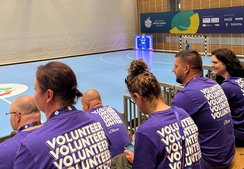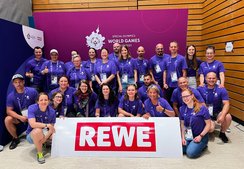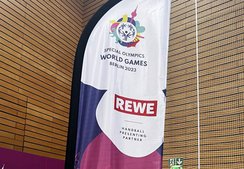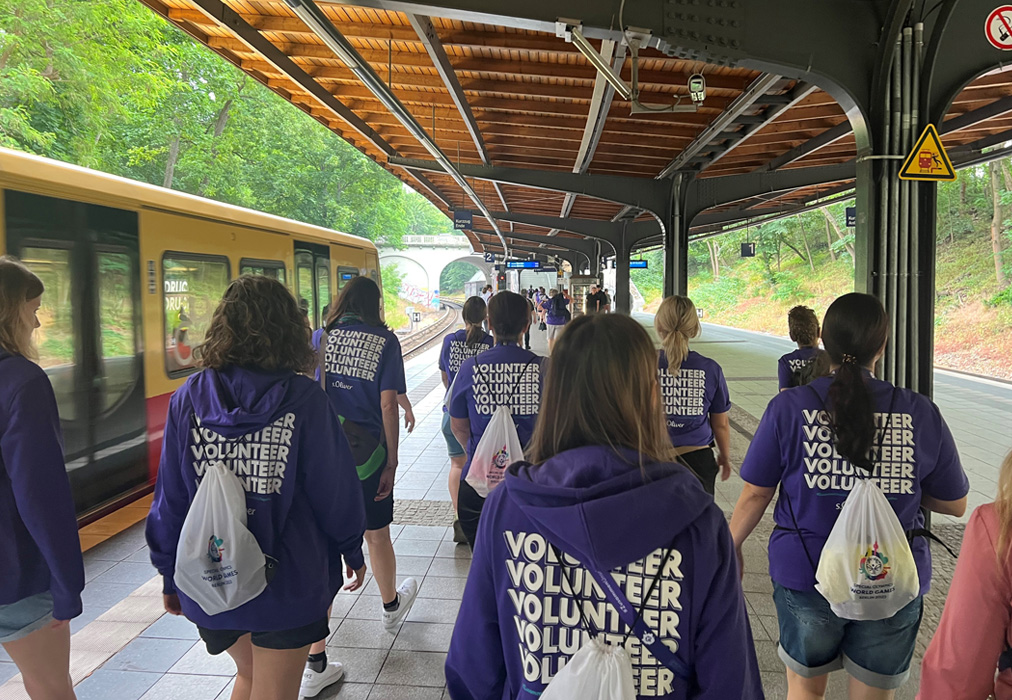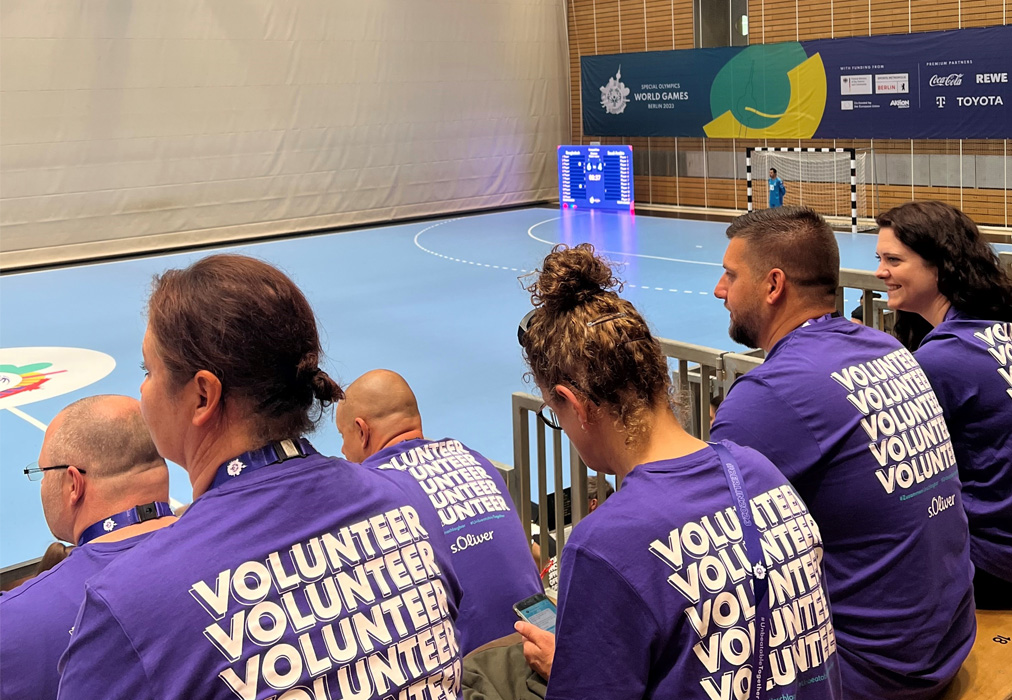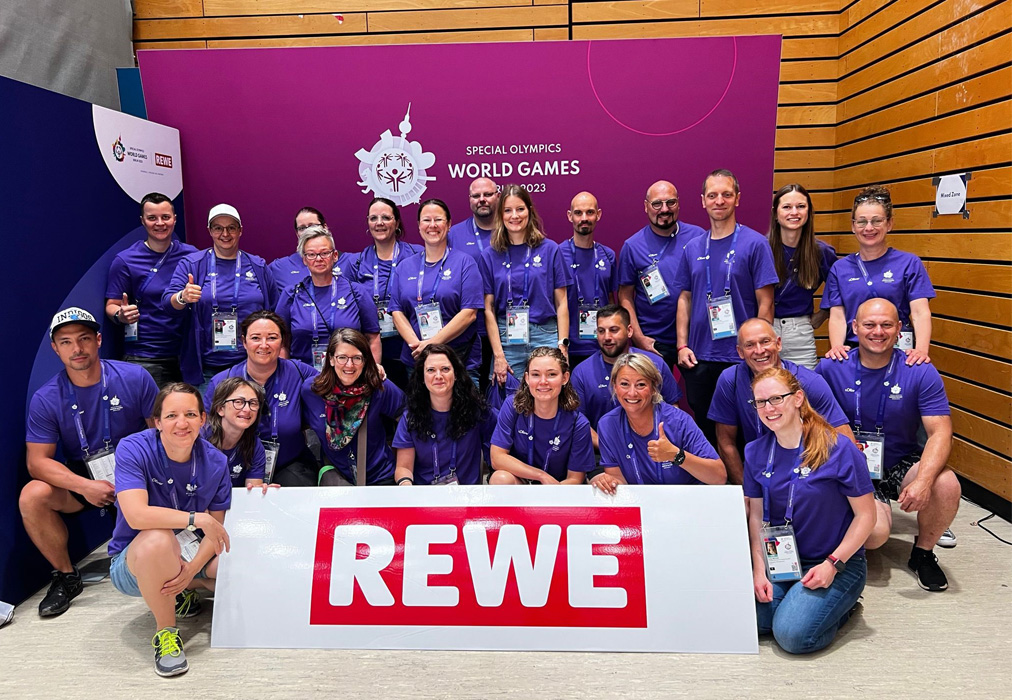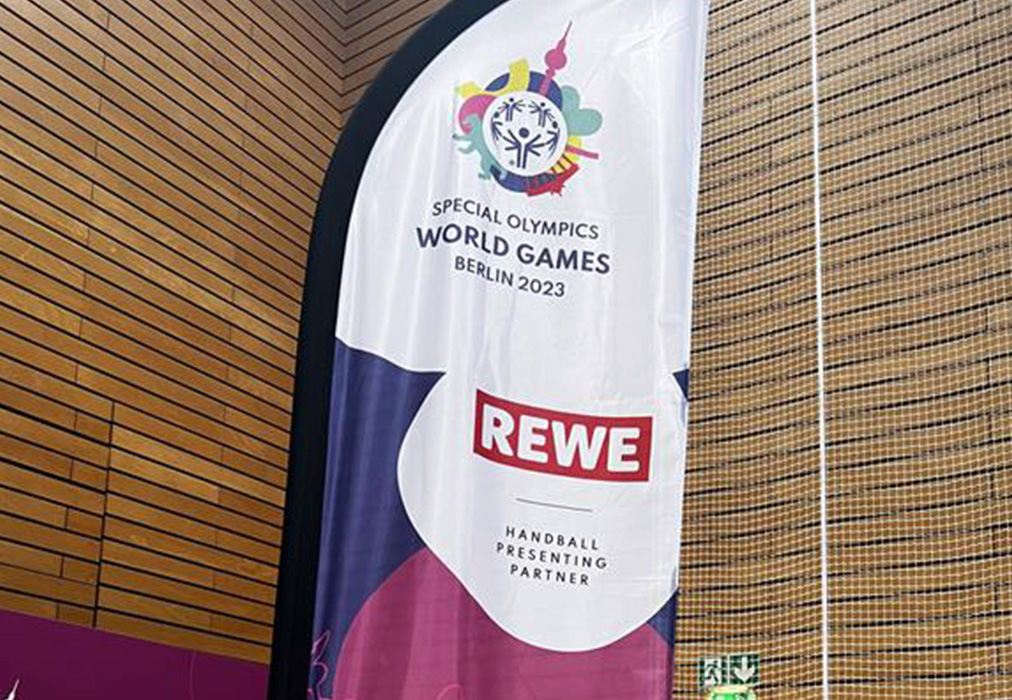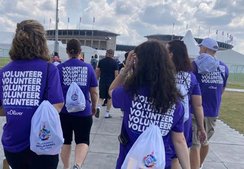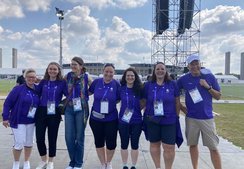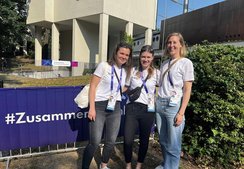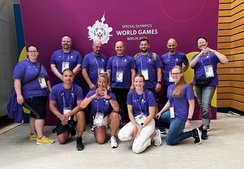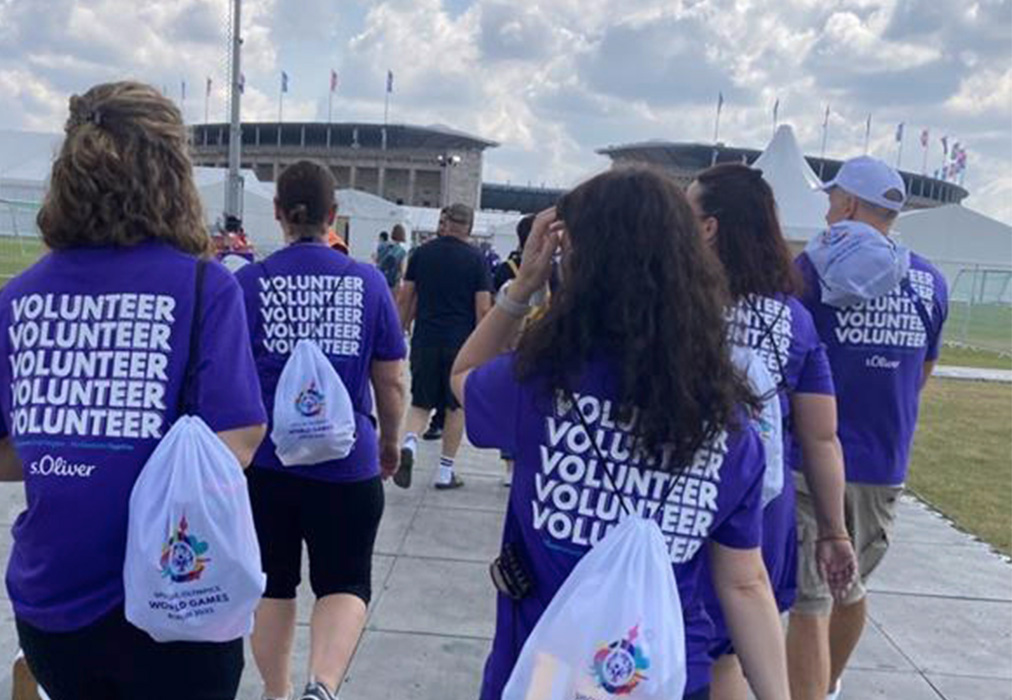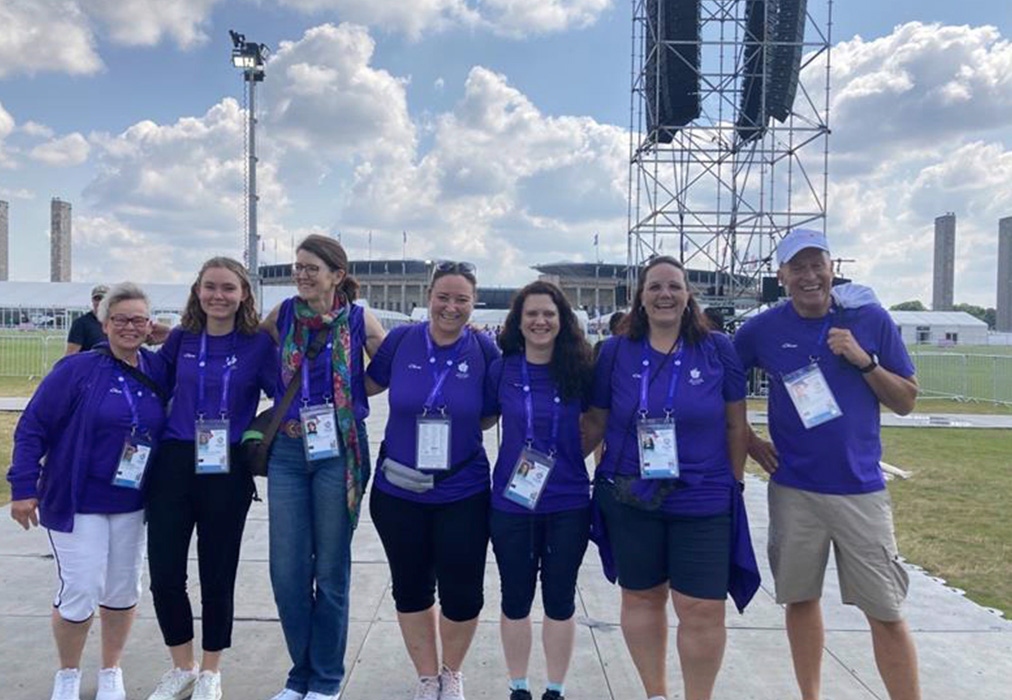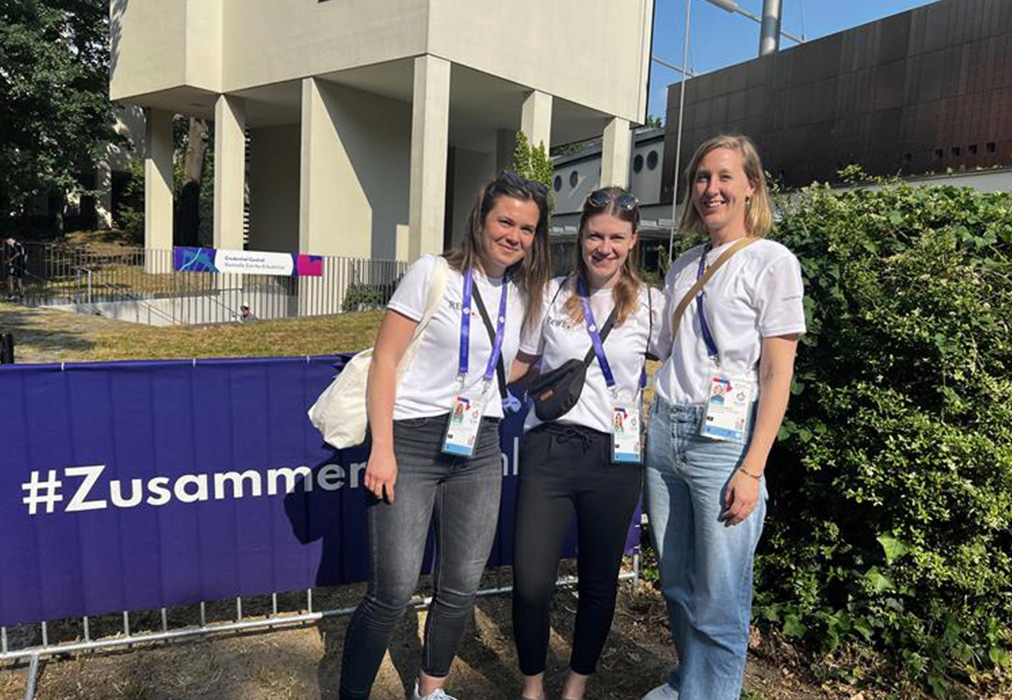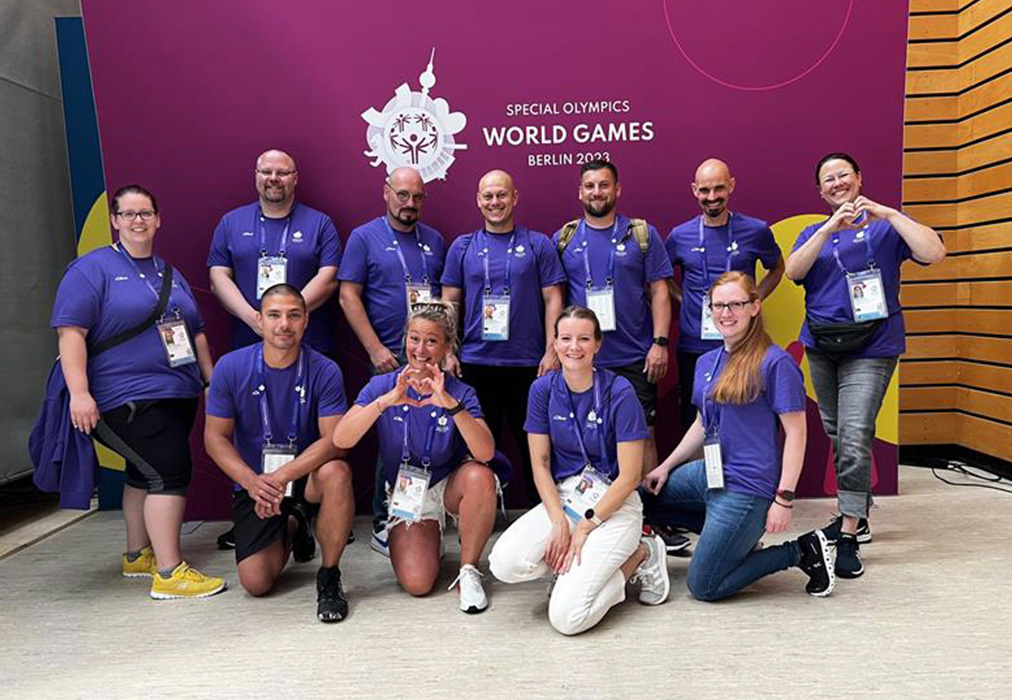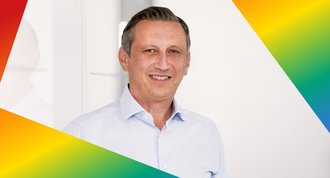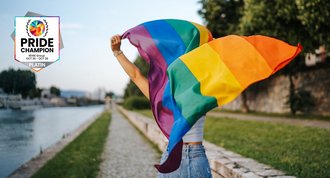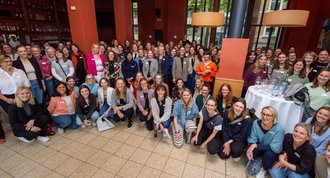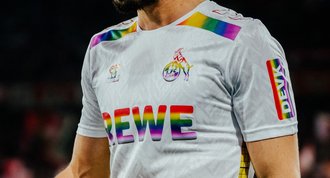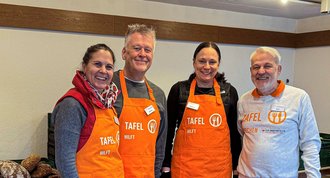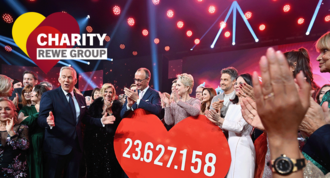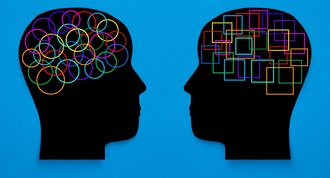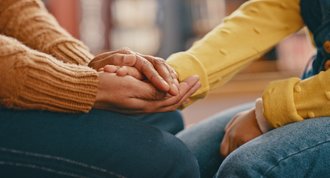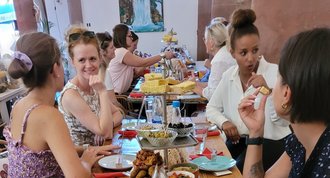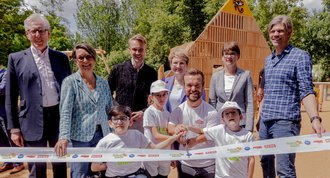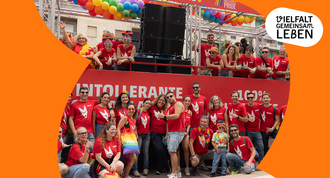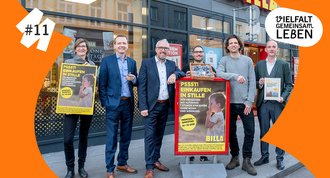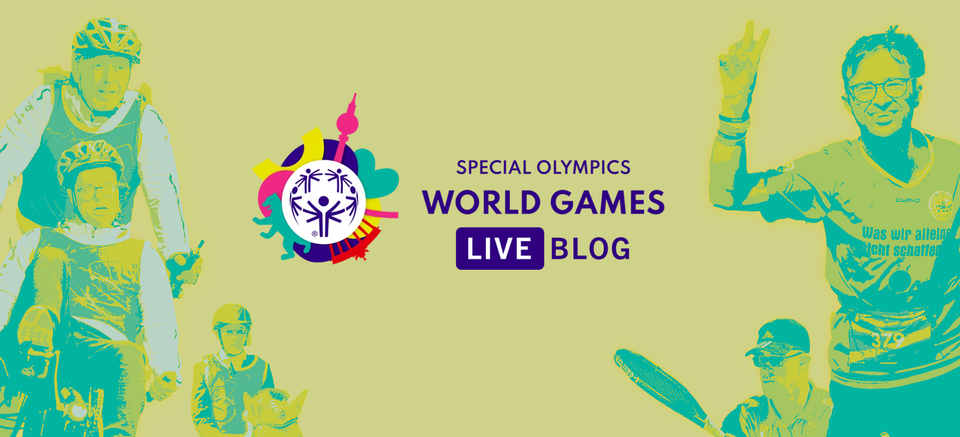
An exuberant celebration with 21,000 people at the Brandenburg Gate in Berlin on Sunday (25 June) brought the Special Olympics to a worthy close.
A great sporting event comes to an end
Our volunteers cheered us on right to the end. The chat group was overflowing with emotional pictures. Julius Dietrich from the REWE supermarket in Lehrte, who competed for Germany in tennis, only just missed out on a place on the podium. But that wasn't the point in the end. As basketball legend Dirk Nowitzki, official Friend of the Games, emphasised. It was about people coming together, doing sport together, learning from sport and being cheered for their impressive achievements.
The Special Olympics achieved this. There were many highlights, emotional moments and friendships that were forged. And last but not least, the Special Olympics have found a fan community: 100,000 tickets sold for the competitions speak for themselves.

Holding out in constant rain
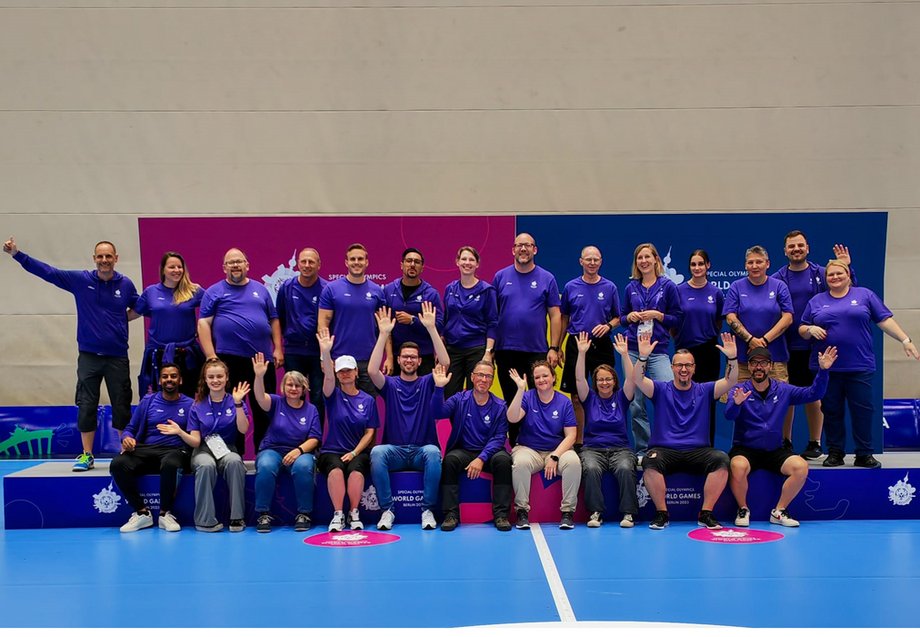 In handball, the semi-finals on Friday were about making it to the final. Our volunteers were there, of course
In handball, the semi-finals on Friday were about making it to the final. Our volunteers were there, of course
The storm that swept across large parts of Germany on Thursday arrived in Berlin shortly after the end of day 7. The thunderstorm subsided, the rain remained and so competitions such as tennis, cycling, hockey and sailing were literally cancelled.
In handball, the men's teams from Spain and Kenya as well as Denmark and Hungary reach the final in their respective divisions. Kenya and Denmark decide the games in their favour.
In the women's final, the German team is defeated by Bangladesh. The second gold medal goes to Azerbaijan.
And: Federal Chancellor Olaf Scholz pays a visit to the Special Olympics.
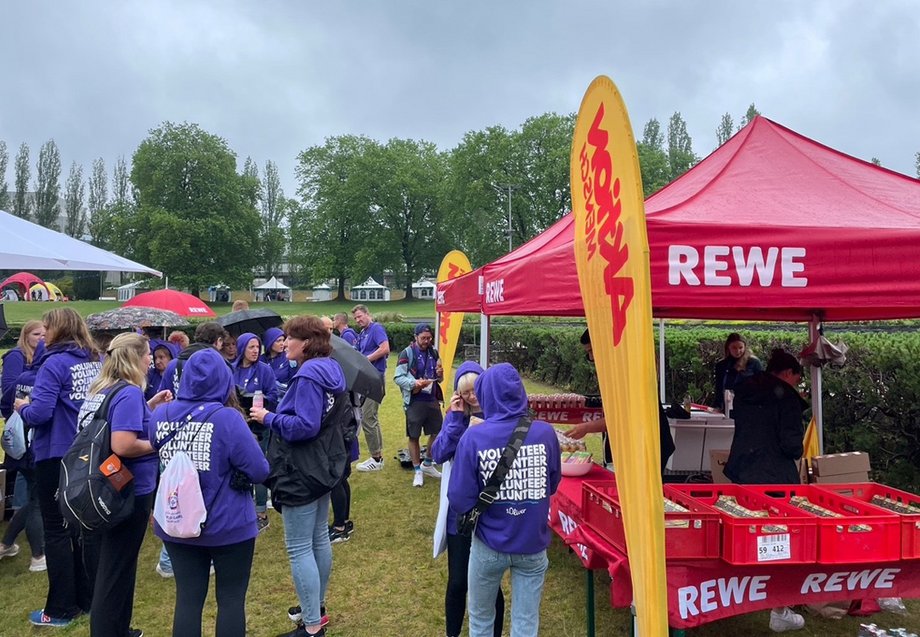 It was raining cats and dogs on the day of the inclusive picnic organised by REWE and Aktion Mensch
It was raining cats and dogs on the day of the inclusive picnic organised by REWE and Aktion Mensch
Some volunteers were not deterred by the pouring rain and stopped by the inclusive picnic organised by REWE in the summer garden on the exhibition grounds in Berlin.

Sporting ambition and challenges
The handball competitions are entering the final round. The teams are highly motivated and want to thrill their travelling fans. The Danes are all the more disappointed when they lose their game against the Ivory Coast, as Denmark has a large fan base at the start. The Costa Ricans, on the other hand, are in party mood: they won against Norway.
Spain, Bharat (India), Bangladesh, Saudi Arabia and Kenya are still in the men's competition. The match between Bharat and Kenya is particularly exciting right up to the last minute and is also high-scoring: Kenya wins by a narrow margin of 27 to 25.
The volunteers cheer on the teams. And then have to face a challenge themselves: Setting up the podium for the award ceremony the next day, including the subsequent rehearsal for the choreography. But the team is already so well-rehearsed on the second day that they overcome this hurdle too. In the evening, it's off to the Athlete's Party at the Brandenburg Gate. A successful day also needs to be celebrated a little.
"It's a great event. I was with Team Spain the whole time and they really grew on me. The togetherness of the participants is just great," enthuses Tobias Damek. And his colleague Thorsten Sachse wouldn't want to miss the event: I'm amazed at how much sporting ambition the teams have. Everyone wants to win. And when the players score a goal, the joy is so great that it makes your heart beat faster."
"A worthwhile endeavour in many respects"
A total of three REWE Group teams are supporting the Special Olympics as corporate volunteers for three days each. The organisation team consisting of Franziska Halstrick, Charlotte Ehl and Antonia Pott, who coordinate the volunteers' work, is on site the entire time. Franziska Halstrick took stock with one.
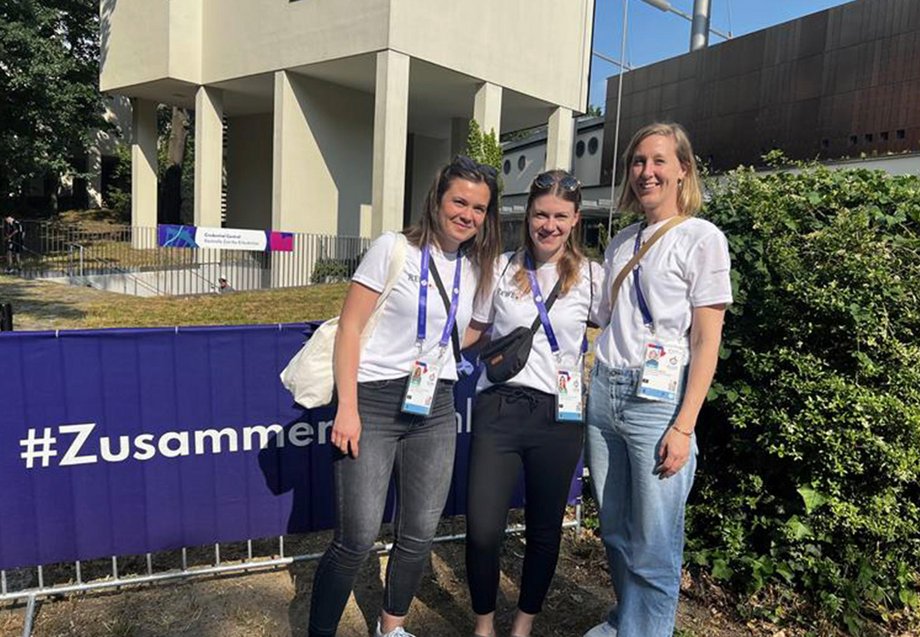
one: Franziska, you from the organisation team said goodbye to the second group of REWE Group volunteers yesterday and the third group is already in action. You're coordinating the shifts, for example, but that's not all? Franziska Halstrick: No, we started organising months before the Special Olympics. Now here in Berlin, we are the point of contact for everyone, because all 100 colleagues are different and have different concerns. And we organise get-togethers for the evenings, for example, going to the Brandenburg Gate yesterday with those who wanted to. Another time, many of us went to the beer garden together. Of course, we are primarily here to support the Special Olympics. But it's also a great opportunity for us and our colleagues to get to know each other. During the assignments or at the latest in the evening, when everyone gradually arrives at the hotel's rooftop bar as the sun goes down, employees who otherwise have few or no interfaces get to talk to each other.
one: Two thirds of your time at the Special Olympics are over. How would you and your organisation team sum up the interim results?
Franziska Halstrick : All the hard work in the run-up to the Games was absolutely worth it. The feedback from the first and now also the second volunteer group was very positive. I can say that we have definitely achieved our corporate goal of strengthening social commitment. The first group, who were on assignment until Tuesday, said when they left that they would definitely tell their teams and colleagues about these days and sensitise their departments to the topic of inclusion. So for us as an employer, it was a worthwhile endeavour in many respects.
one: Will it continue?
Franziska Halstrick: We from the organising team will definitely take away some lessons learned. And even if it is still too early to think specifically about how, when and where, one thing is certain: we will continue with some form of corporate volunteering.

Goosebump moments
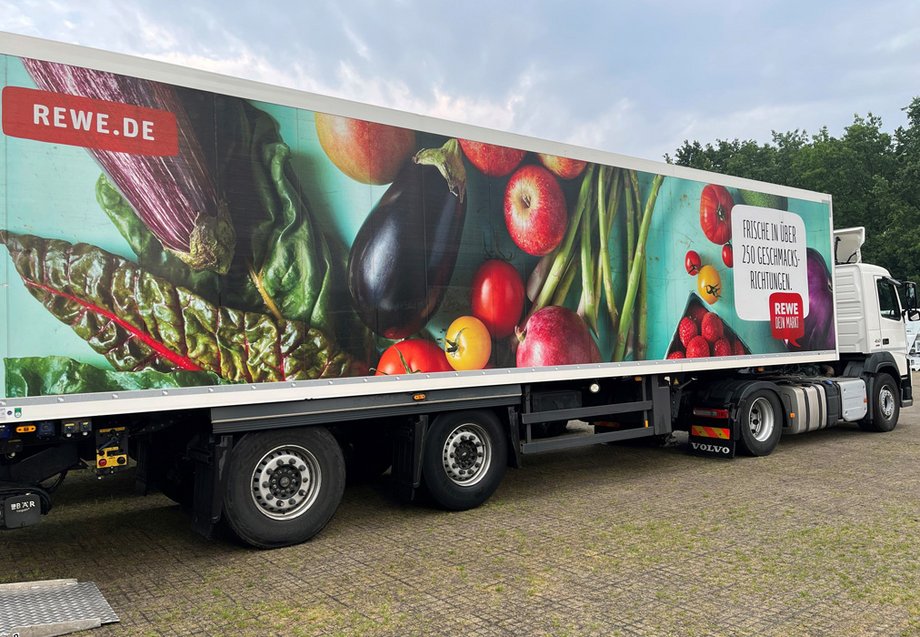 Shortly before 6 a.m., the REWE lorry pulls up at the loading ramp in the catering facility in the Olympic Park
Shortly before 6 a.m., the REWE lorry pulls up at the loading ramp in the catering facility in the Olympic Park
No sport without healthy food. It's just before 6 o'clock in the morning. The REWE lorry pulls up at the loading ramp of the canteen kitchen in the Olympic Park. It is the second time this week that driver Steffen Strick has driven to the supply centre for the Special Olympics. "I think it's great that REWE is supporting us here with fresh food. On the first day, I took a photo and posted it on my Insta channel," he says as he pushes the trolleys into the tent that serves as storage here. He mainly has fruit with him today, but also a few sweet snacks.
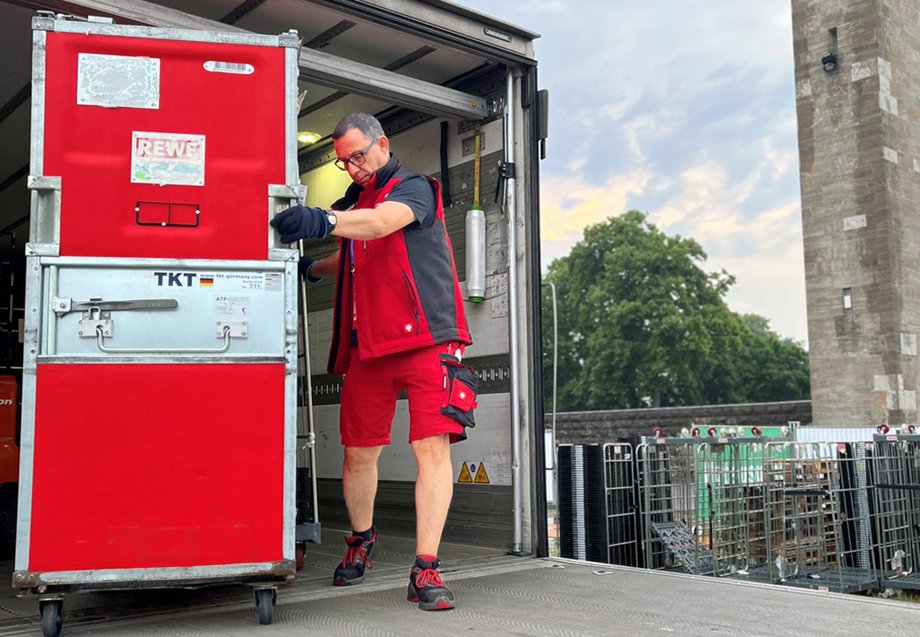 Streffen Strick brings the second delivery to the canteen kitchen in the Olympic Park
Meanwhile, the caterer is already a little hectic. After all, thousands of athletes and volunteers are catered for here every day. Today, pasta with Bolognese and a side salad are on the menu. Those who don't like meat can opt for the vegan option.
Streffen Strick brings the second delivery to the canteen kitchen in the Olympic Park
Meanwhile, the caterer is already a little hectic. After all, thousands of athletes and volunteers are catered for here every day. Today, pasta with Bolognese and a side salad are on the menu. Those who don't like meat can opt for the vegan option.
The volunteers, who are taking over as the second team for handball today, are also under a bit of stress, as the S-Bahn is not running as planned. In the end, however, they all arrive safely and are assigned to their teams. Scott goes into raptures: "You immediately get goose bumps. It's a unique atmosphere here that everyone should experience at least once."
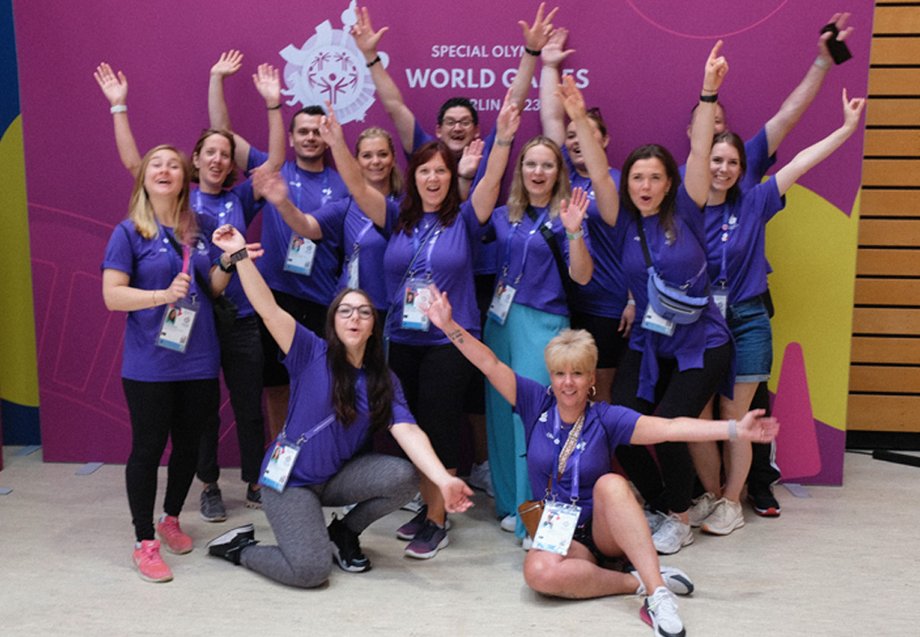 The new early shift team is full of vigour at the start
The new early shift team is full of vigour at the start
Most of the new volunteers are assigned to the handball teams again. I'm given a kind of special assignment, which is rather unspectacular from the outside - I sit behind a row of young people recording statistics on tablets and make sure they have some distance from the cheering spectators. However, it is quickly explained to me that these unified observers play an important role: This is because they are responsible for ensuring that all team members are equally involved in teams where athlete:s with and without disabilities play together. In addition, the number of athletes with and without disabilities on the pitch is clearly specified. The unified observers ensure that this ratio always remains the same, even in the event of substitutions or time penalties. If a team does not adhere to these rules, the unified observers will penalise this team. It can be annoying when spectators right behind them sing "Sweet Caroline" at the top of their voices and cheer on the athletes.

Julius heads to the tennis court at 6.30 am
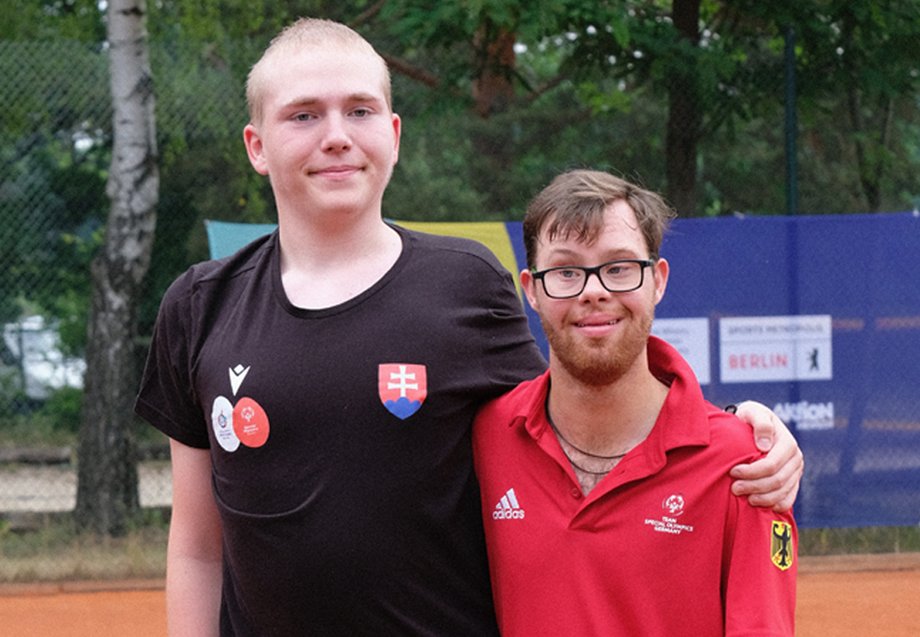 Thomas Sebatian Marton (Slovakia) competed in the men's singles against Julius Dietrich (right)
Thomas Sebatian Marton (Slovakia) competed in the men's singles against Julius Dietrich (right)
Today I'm visiting my REWE colleague Julius Dietrich, who is taking part in the Special Olympics for the German tennis team. The tennis players are divided into different levels, depending on their skill level. Julius is competing in the men's singles at level 5 and in the unified sports mixed doubles and unified sports team competition at level 6.
The tournament is exhausting for the athletes: "Julius gets up at five o'clock in the morning and the team bus leaves for the court at half past six," says his mum Silke Dietrich, who is there with her family to cheer him on. He finds out exactly when Julius has a game on site. When I arrive at the pitch, he is competing in the Unified Teams Competition, in which athletes with disabilities compete together with unified partners in national teams.
He loses the match, but ultimately that's not what matters here. At the Special Olympics, the Olympic motto "Taking part is everything" is actually put into practice. The players are ambitious and have fun. However, the performance principle plays no role at all here.
Clouds gather - a heavy downpour comes - the games have to be interrupted. Now everyone has to wait. A day on the pitch can be a long one for the athletes - an effort that should not be underestimated, as the rain does little to cool them down, but it is now swelteringly hot.
Meanwhile, some of the first volunteer team have finished their last shift at handball. Some volunteers literally stay on site and help out in the afternoon, as there is a shortage of helpers at the moment. During the lunch break, there is time to take stock of the three days at the Special Olympics:
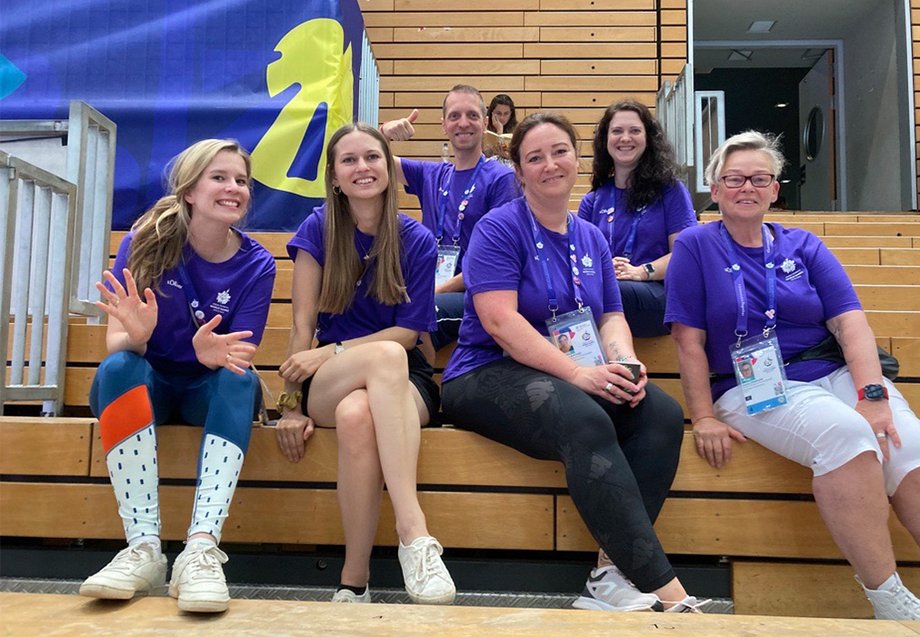
For Anna Elena Köntgen, Anja Meeh, André Günther, Kathrin Burchert, Sabine Breideneichen and Andrea Zwirnlein (from left to right), their volunteer commitment comes to an end today. After three days of supporting the handball teams, the time for the first of REWE Group's three volunteer teams at the Special Olympics has come to an end. They will hand over the baton to the next REWE Group team, which will start helping tomorrow.
one: What was your personal highlight during these three days?
Anja Meeh : My highlight was the way the people here interacted with each other, the athletes with each other and the volunteers with the athletes. I thought it was great how nice and caring everyone was.
André Günther: The consideration that everyone showed each other was impressive. The Special Olympics teams looked at the level of play of the other teams. And accordingly, they didn't throw the balls so hard, for example.
Anna Elena Köntgen: The openness of all the cultures here was a highlight for me.
Kathrin Burchert: I found this pure joy of the athletes so great..
Andrea Zwirnlein: ... and how they were with each other. If something happened, an own goal for example, they hugged and comforted the person it happened to. In the middle of the game.
Sabine Breideneichen: And that's how they treated us volunteers too. I once passed a ball back to the Danish women's team from out of bounds. And the Danes celebrated this rather long throw. And I thought it was great how the referee took a time-out to retie a player's loose shoelace.
one: Would you recommend such corporate volunteering or do it again yourself?
Anna Elena Köntgen: I would definitely do it again.
Andrea Zwirnlein: Again immediately. I would certainly take a completely different approach the second time round with my current experience. I would know more quickly where I can and may provide support.
one: What was it like within the REWE Group team?
Kathrin Burchert: I thought it was great to get to know colleagues from so many different corners of Germany..
André Günther:... from stores, head offices and logistics..
Anna Elena Köntgen: And in the evening, most of them went out for dinner together and just wanted to do something together.

"This warmth did us so much good"
The classification. In Berlin, you can't get past the Special Olympic World Games. We meet athletes and volunteers everywhere. The S-Bahn trains are plastered with adverts and the volunteers and athletes on the trains are singing in anticipation of the first competitions.
The climate in the city is like a laundry room. But the sultry weather does nothing to dampen the atmosphere around the Olympic Park. The teams cheer each other on and there is singing every now and then. The REWE Group volunteers are each looking after one of the 18 handball teams from Azerbaijan to Costa Rica, Saudi Arabia and Hungary. A total of 173 athletes and 40 unified partners are taking part. There are ten women's teams and eight unified teams. Unified teams are inclusive teams made up of people with and without intellectual disabilities. The athletes with intellectual disabilities are called athletes and the athletes without intellectual disabilities are called unified partners. Some teams need more support, others less. For some, communication works well because everyone speaks English, while others communicate with gestures, as the usual foreign languages are not an option here.
Then comes the shock for the team from the Ivory Coast: a player has twisted her ankle and has to be taken to hospital with a limp. Bettina and Antje, who both speak very good French, quickly split up: One goes to the hospital with the injured player and the first aider. The other spontaneously takes over looking after the team.
Great warmth. Steffi Kusch talks about her experiences: "I'm responsible for the Saudi Arabian athletes during my volunteering programme. This team is made up entirely of young women with Down's syndrome. On the first day, I fetched them their lunch as they had a game at mealtime. When they had finished eating, one of the girls came up to me from behind, put her arms around me, gave me a peck on the cheek, then beamed at me and left again. This warmth did me so much good."
The classifications in the first few days are not about who goes through to the next round. No team will be eliminated here. Instead, the games are used to divide up the groups so that teams of roughly equal strength play against each other in the next round. This is because the spirit of the Special Olympics is inclusive and not competition-orientated.

The first volunteer shift.
Purple mood in the lobby. The REWE Group volunteers meet at the hotel entrance to head to their first shift at the Games. Around their necks, clearly visible above their purple T-shirts, are the DIN-A6-sized accreditations on purple ribbons. Charlotte from the organisation team had handed them out, together with a copy of "Asterix at the Olympic Games" in easy language, published by the Special Olympics.
The REWE Group volunteers support the handball players at the Horst Körber Sports Centre on the edge of the Olympic Stadium, idyllically situated amidst greenery in the west of Berlin. Before that, however, the first accreditation takes place, then it's across the grounds by the football pitches to the volunteers' lounge, where Vio water, ja! bars and REWE organic fruit are available for the helpers. REWE is a premium sponsor of the Special Olympics.
The dress rehearsal. The Olympic site is vast, and so are the paths. Another check of our accreditations in front of the handball area, a last look from security in front of the athletes' area. Then we're off. Sport officials in black shirts hand out the first task: a rehearsal for the soft opening - the small opening that each sport organises in its own area after the big one the evening before. The rehearsals take place without the athletes, who are warming up or have yet to arrive.
Each volunteer is assigned a team for which he or she is responsible from now on. They are given the corresponding sign: SO Bangladesh or SO Germany. SO stands for Special Olympics. There are men's and women's teams, some countries like Denmark have both, Hungary comes with a men's team, Costa Rica with a women's team and the host country Germany has three teams.
From the tangle of volunteers trying to implement the instructions, a line of imaginary athletes gradually emerges, lining up in a sunbeam shape and listening to the greeting from Beata Fuchs, an experienced athlete from the German team. The first attempt went quite well. Then the volunteers set off in search of their respective teams: Spain, Kenya, India, Ivory Coast... They introduce themselves to the players and coaches and feel out the communication. Who speaks English, maybe a little Spanish? Melanie gets talking to the Norwegian team in Swedish, and everyone manages to line up all the teams with their hands, chunks of language and hands-on friendliness and enter alphabetically with music. There's a space for the Danish women between Denmark Men and Hungary, but they arrive in time for a video greeting from the Füchse, Berlin's handball club.
The first games. The men play in unified sports teams made up of Special Olympics athletes and athletes with and without intellectual disabilities (referred to as "partners"). The women's teams are pure Special Olympics teams. We volunteers are on hand to offer support to our respective teams. For most of the teams' questions, we have to ask the Sport Officials or Key Volunteers before we can pass on the answer. It's just like in real life: Keep your eyes open, ask around, learn by doing and improvise a little.
This is also how all the athletes who play over lunchtime get their food. That will be the main task on the day: Photographing or collecting all player accreditations, rushing to the remote kitchen tent, having all player QR codes scanned - and thinking very hard with the nice catering volunteers about how to transport around 70 food boxes into the handball hall without boxes. These are not allowed to be handed out for hygiene reasons. In the end, cardboard boxes are the solution.
Then it's time to watch the games from the stands. And what happens is why these Special Olympics exist. I don't see athletes with disabilities, but simply handball players who run free, foul, take chances and miss chances. And who comfort their keeper with a big hug when they concede a goal. There are yellow cards and great throws - and, above all, spectators clapping, screaming and cheering.

The opening ceremony
Berlin, 17 June.The arrival. The main station is overflowing with people: Travel and Tourism, locals, DB service staff. As the first harbinger of the Special Olympics, a boy takes two steps at a time, wearing a red jersey with the English word "Kenya" and the emblem of the world's largest sports movement for people with intellectual disabilities and multiple disabilities.
In front of the station, an attendant endeavours to board a bus with two athletes. One athlete in a wheelchair, the other visibly struggling to keep his balance. Even though the step on the bus is very low, it is there. The three of them look like a well-rehearsed team, the companion lifts the wheelchair backwards, the team-mate helps at the front. They are still on the bus when the driver gets up to help. I often think about these three in the evening, at the big opening ceremony, at the parade of over 6,000 athletes from 190 countries into the Olympic stadium. They got on and off aeroplanes or trains from all over the world, some with wheelchairs or walking frames. How many literal barriers they had to overcome to finally celebrate inclusion at a gigantic opening show in Berlin's Olympic Stadium. Or - as Special Olympics ambassador Emmanuele Dutra de Fernandez Souza put it: she doesn't want to spend the rest of her life talking about inclusion, she simply wants to live it: "We want the same opportunities, the same respect."
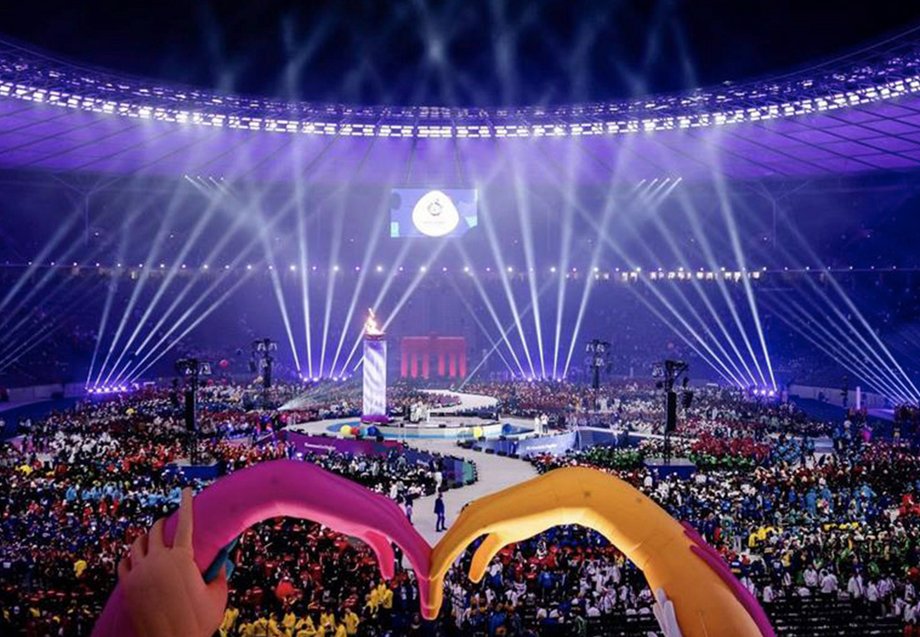 As the opening evening draws closer, purple is increasingly blending into the colourful summer streetscape of Berlin. It is the colour of the T-shirts for the volunteers, who, like the athletes, come from almost every corner of the world. The 100 REWE Group volunteers, who are divided into three groups and support the athletes for three days each, come from all corners of Germany.
As the opening evening draws closer, purple is increasingly blending into the colourful summer streetscape of Berlin. It is the colour of the T-shirts for the volunteers, who, like the athletes, come from almost every corner of the world. The 100 REWE Group volunteers, who are divided into three groups and support the athletes for three days each, come from all corners of Germany.
Whether they are businesswomen or drivers, service department heads or IT business analysts, category managers or regional representatives for the severely disabled, project managers or store managers: everyone is happy to be there, everyone quickly gets talking across the "borders" of regions, areas and activities, but no one has the idea of being on first-name terms or even asking if they can be on first-name terms. The majority make their way to the opening ceremony together.
The opening ceremony of the Special Olympics. Fun with the Schuhplattler troupe, fireworks to the Blue Man Group, dancing along in the stands to Madcom's "Are you ready", ceremonial speeches from dignitaries and athletes: The opening of the Special Olympics was in no way inferior to any other Olympic Games kick-off. The fact that it was perhaps a little more colourful was not so much due to the purple, pink and petrol décor and play of colours, but mainly due to the athletes. In elaborate national costumes, in simple tracksuits or as pharaohs (Egypt), disciplined (China), dancing (Cuba) or waving wildly (almost everyone), whether in fours (Aruba, Burundi) to forty (Monaco and Gibraltar, surprisingly) or as a stadium-filling troop like host nation Germany: each delegation had something very unique and that made the perfect event a little more approachable. This was achieved not least by the relay runner with the Olympic flame, who - instead of handing it over to the next runners - ran into the centre of the stadium to light the Olympic flame without any detours. Holding the flame high in front of her with both hands, she was both energised and exhausted. She was led back, but this little moment - amidst the perfect choreography - was the secret highlight of the opening of the 16th Special Olympics International Summer Games.
+++
"Sport has the power to change the world." This is what Sven Albrecht, Managing Director of Special Olympics Germany, says in the podcast Sports Maniac. Since Saturday, 7,000 athletes, 190 delegations and thousands of volunteers have been proving that sport can be more than just a money-making machine.
The REWE Group is on site with 100 corporate volunteers. REWE is supporting the event as a premium partner with food and a large picnic, among other things. In order to organise the largest multi-sport event in Germany since the 1972 Olympic Games in Munich, support is needed - also from the media: eleven TV stations have joined forces to form a media alliance and will report on the competitions.
The aim is for the event to develop an appeal far beyond Berlin. After all, the World Games are of course a highlight of the work of the Special Olympics Germany organisation. The organisers hope that the event will draw attention to their actual work: To promote participation and integration for people with intellectual or multiple disabilities everywhere in society, so that it becomes natural in everyday life to take their needs into account. Sport can play an important role in this endeavour, which has so far only been used to a limited extent in Germany. According to Special Olympics Germany, only eight per cent of people with intellectual disabilities had access to sport before coronavirus - the World Games are intended to help open up this opportunity to the remaining 92 per cent.
The numbers: With 7,000 athletes, 26 sports and an expected 300,000 spectators, the Special Olympics are the world's largest inclusive sporting event. Athletes with intellectual and multiple disabilities will compete in 26 sports, including badminton, handball, golf, sailing, judo, tennis and rhythmic gymnastics, in Berlin's Olympic Stadium. Around 16,000 volunteers will be needed to organise this sporting event, of which around 2,000 will come through corporate volunteering, i.e. company volunteering programmes that promote employee engagement.
100 of these volunteers come from the REWE Group, making it one of the companies with the most corporate volunteers. They support the games on site for three days at a time.
Their tasks are varied: from looking after the athletes to visitor services and accompanying the award ceremonies. REWE is also a premium partner of the Special Olympics.
- 7,000 athletes
- 26 sports
- 190 delegations
- 20,000 volunteers
- 9 days full of sport and emotion
The history: The Special Olymics were founded by the Kennedy family back in the 1960s. It was triggered by the fate of John F. Kennedy's sister Rosemary. The family hid the severely disabled child. However, her sister Eunice was moved to found an organisation whose mission is the participation of people with disabilities through sport.

